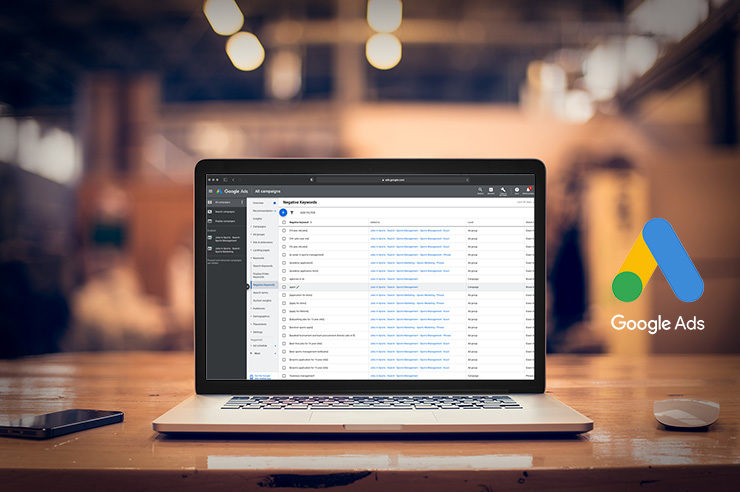Negative keywords are a staple of CPC account optimization. With negative keywords, you can control the quality of your search traffic and ultimately optimize your client’s or your small business’s advertising budget. Many CPC accounts are underperforming in both budget and quality traffic overall because of the lack of time spent or culture in developing negative keywords. This blog will cover how negative keywords can impact your account, how negative keywords can aid your overall strategy, and how to adjust to the changes taking place from Google’s updates using negative keywords to improve your CPC strategy going forward.
#1 Reason Why You Should Value Negative Keywords
It would be best if you valued negative keywords as equally crucial as bidding on any keyword terms in the planning stages using Google’s Ad Planner. When starting a new campaign and planning your keywords terms to bid on, Google will give you information about what they think are keywords relative to your business. Naturally, because Google knows nothing about your business, you can choose to remove specific terms that don’t fit the theme of your business’s market, thus narrowing your keyword focus. Just imagine right from the start of setting up your campaigns, negative keywords can eliminate the waste of your budget!
The Removal Of Modified Broad Match Types: Negative Keywords Are Crucial Important Than Ever In 2021
Google recently got rid of modified broad match keywords. As a result, this fundamentally changes CPC strategy because the real fight that CPC professionals deal with is balancing search volume and quality of traffic. Before Google removed the modified-broad-match type, you could use modified broad-match terms to force specific themes for your adverts to show and not have to worry about the order of your keywords so you could increase your search traffic. Not having this keyword match type makes balancing search traffic volume and quality difficult because you have to change up your strategy.
Moving forward, a phrase match and an exact match are all you have left to balance your search traffic. However, there’s more bad news with Google’s removal of modified broad match keyword types, and it has to do with phrase match keywords. Before 2021, you could count on phrase-match keywords appearing in the order in which you put your keyword terms. Well, not anymore, and this is where negative keywords become even more critical to CPC professionals because it’s going to be the only way to achieve that balance in traffic volume and budget optimization.
Negative Match Types: The Focus, The Soul, and The Heart of CPC Strategy Moving Forward
After getting disrupted here, you might be asking yourself, now what? How can I use negative keywords to help me adjust my strategy to boost search traffic and push qualified traffic to my client’s website or your small business’s website? There’s this old saying, “That as much as things change, they just stay the same!” and for the topic of negative keyword match types, this is true. You need to focus on your culture or process in building and optimizing your CPC accounts.
Negative Phrase Match Keywords – Preempting and Preserving the Order of Your Keywords
What you should focus on now is the preempting of your negative keyword match types. Essentially, for every keyword match type, you can build a negative match type. One thing you are probably not aware of is that although Google won’t guarantee the order of your keywords in a phrase match for targeting, you can set the order of your keywords using a negative phrase match keyword. Setting the order of keywords is especially crucial for businesses with extreme importance of keywords placed in a particular order; this is heaven-sent! Ultimately, you will need to double down on your planning phase to build any new campaign that includes keeping a manual list of keyword phrases and creating a negative phrase match.
Negative Exact Match Keywords – A Word of Warning, Don’t Remove Too Explicitly
After reading about a counter to Google’s removal of modified broad match keywords, you might be thinking, “Why can’t I negatively phrase match on precisely what I don’t want?” There are times when this is a deal-breaker, and you have to do it. However, don’t go crazy with this negative keyword match type. Why? Well, keywords have hidden information in them, and if you go back to the start, you have to observe and be mindful of marketing as a discipline of testing and segmentation.
We don’t know what’s going to work from the start. I was once told by a superior of mine long ago, “As marketers, we sorta just throw things against the wall and see what sticks!” Don’t get it twisted; it’s not that marketers are lazy; a good marketer knows that measuring is an essential part of building a successful marketing objective.
Use Google’s Ads Planner To Develop Better CPC Strategy Using Negative Phrase Match Type
So if you can understand this context, you can see why you should not try to eliminate keyword themes exclusively. You could be ruling out a short-tail keyword or a long-tail keyword that can convert traffic. Reducing your keyword traffic too early matters more when you are a smaller business where search traffic is the most important of all marketing objectives guiding your strategy.
What you should do is start with Google’s Keyword Planner and remove what you know from the start in a possible negative phrase match first. Then as your campaign ages and you begin to get data back, you can use Google Ads user search term report, layered over other meaningful data points like:
- Impressions
- Clicks
- Click Thru Rate
- Conversion
- Cost Per Conversion
- Etc.
Pulling that user search term report is vital to continuing to improve and optimize for the budget and conversion performance. However, you should know that from now on that Google will limit some of the data you would typically expect in this report. With Google limiting your data through your campaigns’ progression, it will become more apparent that the most important thing you can do as a CPC professional is to start with a good setup of negative keywords. You’ll get into the routine of utilizing that Google Ads planner, talking more with your client, and learning their market better to develop better negative keyword themes.
Google’s User Search Term Report – Limited Data, About a 45% Loss In Data, Will Affect Your Ability To Develop Negative Keywords
One final area where Google’s removal of modified broad match terms will affect your negative keyword strategy and overall advertising strategy is reducing available data. Due to the way you will be bidding, Google wants more of your budget so its Machine Learning can attempt to bring the most qualified traffic to your website. With phrase match terms not having an order guarantee, you are likely to see a lot more insignificant traffic, and Google won’t even report on those terms because there’s not enough data.
When you go into your account now, you will see your visible clicks and an additional data point in click that shows total clicks. To understand just how much data you will lose with these changes from Google, divide the visible clicks from the hidden clicks. The percentage of visible clicks you pay for versus the hidden clicks not reported by Google; will be a big concern for huge accounts and small accounts.
To combat this loss of keyword data, you will need to double down on your keyword research efforts in a scalable fashion using Machine Learning. Using Natural Language Processing will aid you in researching additional keyword themes you can eliminate from your adverts and reduce budget waste by looking at your competition.
Using NLP and or Machine Learning Stepping Up Your Negative Keyword Research
Developing negative keywords to help you optimize your budgets is to get more involved with developing negative keywords in a research phase. Implementing Machine Learning or Natural Language Processing will give you a more data-driven approach. It might take some ramp-up time if you choose to implement Pythonic workflows. However, you can rest assured that SASS solutions are coming to help you with this. But until those solutions and or services hit the market, you can use Python and Pandas to build the data you need to develop keyword themes preemptively.
Your Competition Will Have Unique Selling Points. Learn Those Themes Using Natural Language Processing
One of the best ways to start developing negative keyword lists is to get familiar with your competition’s content and keyword themes. You can aggregate your competitor’s website content to build named entity models. These name entity models will help you evaluate keyword terms that you want to remove or even potentially add keywords to develop additional information through client conversation or internal discussion for new campaigns and ad group creation.
For more on natural language processing and named entity modeling, see more with – Spacy.io
Use Keyword Tools To Help With Negative Keyword Development
If you don’t have time to build Machine Learning solutions to use or to upgrade your CPC team’s skill set, you can use tools that utilize Machine Learning concepts. One such tool is Ubersuggest, which you can use to help you with negative keywords using natural language processing to build on your data-driven measurement approach. What’s excellent about tools like Ubersuggest is how you can compare how you stack up against your competition. Using tools like Ubersuggest will help you identify negative keyword themes to build a new account or launch a new campaign.
Recap, Why Negative Keywords are Important, and What You Can Do Moving Forward?
Now that you have an updated understanding of what’s taken place in 2021 and Google’s move to remove Modified Broad Keyword Matches, let’s quickly recap the takeaways and some solutions to help you improve your negative keyword efforts.
#1: Make sure you change your culture to set up new Google ad campaigns. When you develop new campaigns, take as much time to add many negative keywords from Google’s Ad Planner. Setting your negative phrase match terms will ensure you control the order in which your keywords appear and thus trigger your ads. Doing this from the start will ensure you get that balance between search traffic volume and quality of search traffic to your client’s website.
#2: Use negative phrase match keywords instead of broad because you can control the order of your terms and avoid segmenting down too much traffic early on. Remember, when you are executing in this new way, you want to keep your marketer’s hat on at all times; you will need to leave room to test; testing is your CPC strategy.
#3: Use negative keyword tools and upgraded workflows that use natural language processing to parse through your competitor’s content and then develop negative keyword themes for analysis. Avoid doing nothing and dropping the ball and use tools like Ubersuggest and a few others to help add as many negative keyword phrase matches as possible.
Moving forward, you will need to double down on your negative keywords to help keep your budget as the gotchas of phrase match types not being in order start to wreak havoc on your advert performance.
–
If you have noticed a total down-turn in performance in your Google Ads account, and you are seeking an evaluation, Oyova has a team of Professional CPC Consultants that can help you deal with these sudden and unexpected adjustments from Google. Let us review your account and make suggestions for your overall CPC strategy!
Our Awards













